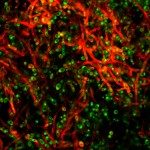Link to Pubmed [PMID] – 26026226
Med Mal Infect 2015 Jun;45(6):189-98
Invasive aspergillosis (IA) is a major cause of morbidity and mortality in immunocompromised adults and children, the number of which has been continuously increasing in the last decades. The purpose of our review was to provide epidemiological, clinical, and biological data and antifungal treatment options in the pediatric population. Several biological assays (galactomannan enzyme immunoassay, β-D-glucan, detection of Aspergillus spp. DNA) have proven useful adjuncts for the diagnosis of IA in adult studies. However, data on these assays in children is limited by small sample sizes and sometimes conflicting results concerning their sensitivity/specificity. Pediatric treatment recommendations are mainly extrapolated from results of clinical trials performed in adults. It is thus necessary to develop new antifungal formulations specifically adapted to the pediatric population and to evaluate their pharmacokinetic/pharmacodynamic profile, their safety, and their effectiveness in infants and children.

